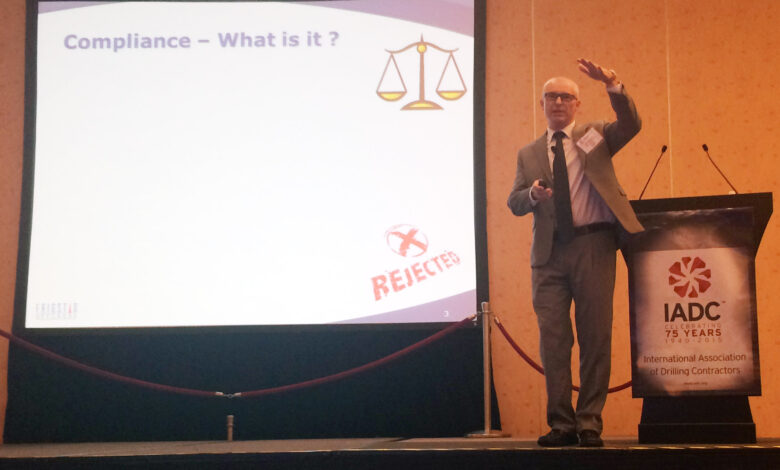Tips to manage compliance, spot potential red flags

Under the frameworks of the US Foreign Corrupt Practices Act (FCPA) and the UK Bribery Act, convictions for corrupt and unethical behavior have grown significantly over the past decade. “Generally speaking, convictions are on the up,” Mark Greenhow, QHSE Manager for Frigstad Offshore, said at the 2015 IADC Critical Issues Asia Pacific Conference on 19 November in Singapore. “The FCPA has more teeth, and the tide is turning. It’s not acceptable to pay a bribe and get away with it,” he said.
Larger companies likely already have a compliance policy in place, but even for small and medium-sized companies, there are a multitude of steps that can be taken to manage compliance issues. In his presentation, Mr Greenhow shared some of these steps:
- Appoint a compliance officer.
- Post whistleblower hotlines.
- Create whistleblower email addresses.
- Log and investigate all notifications. “Didn’t we say this about safety years ago? Don’t just let it go by. Investigate it, and do something about it. Same with this,” Mr Greenhow said.
- Communicate internally with staff.
- Conduct computer-based training annually.
- Communicate with vendors and set the standard. “Let them know where you stand. ‘I’m not going to give you any brown envelopes. Don’t expect any, don’t ask for any. I don’t want you to do it with your suppliers either.’ Try and raise the bar,” he urged.
- Have an easy to read and understood procedure. Mr Greenhow suggested setting high standards in PO terms and conditions.
- Use an approved vendor list as a screening process.
Another approach to manage compliance issues is by monitoring for red flags. Some common ones are:
A third party requests that you provide employment or some other advantage to a friend or relative.
- You receive an invoice from a third party that appears to be non-standard or customized. “If it looks dodgy, it will be dodgy,” Mr Greenhow said.
- A third party insists on the use of side letters or refuses to put terms agreed in writing. “We have a PO for everything in our company. There are no verbal agreements or handshakes. If you want to do a service for me, we’ll issue a PO.”
- You notice that you have been invoiced for a commission or fee payment that appears large given the service stated to have been provided.
- A third party requests or requires the use of an agent, intermediary, consultant, distributor or supplier that is not typically used by or known to you.
- You are offered an unusually generous gift or offered lavish hospitality by a third party. A third part requests that a payment is made to overlook potential legal violations.
- You become aware that a third party engages in, or has been accused of engaging in, improper business practices.
- You learn that a third party has a reputation for paying bribes or requiring that bribes are paid to them, or has a reputation for having a “special relationship” with foreign government officials.
- A third party insists on receiving a commission or fee payment before committing to sign up a contract with you, or carrying out a government function or process with you.
- A third party requests payment in cash and/or refuses to sign a formal commission or fee agreement, or to provide an invoice or receipt for a payment made. “Try to avoid using cash… Cash creates problems in accounting for it,” Mr Greenhow said.
- A third party requests that payment is made to a country or geographic location different from where the third party resides or conducts business. “If you get asked to pay into a Swiss bank account, numbered, not named, maybe something a bit strange is going on there,” he said.
- A third party requests an unexpected additional fee or commission to “facilitate” a service.
- A third party demands lavish entertainment or gifts before commencing or continuing contractual negotiations or provision of services. “If I’m invited on a golfing trip, I decline, not because I don’t golf but because I don’t want to be tainted with it. Unless I pay my own way, then there is no issue.”
In general, a risk assessment should be conducted to assess the likelihood of bribery, particularly for new projects. Mr Greenhow also suggests that companies do their due diligence – ask questions before engaging someone to represent you or your company. “They’re representing you, they’re representing the board, they’re representing the company. At the end of the day, your reputation is on the line.”
He also encouraged communication with staff to ensure they know what procedures are in place. “Staff may think that bribing to get some goods into the country is a good idea because the rig is on downtime and they feel they need to get the rig going,” Mr Greenhow said. Training may be needed to ensure employees are aware of compliance issues and risks.




